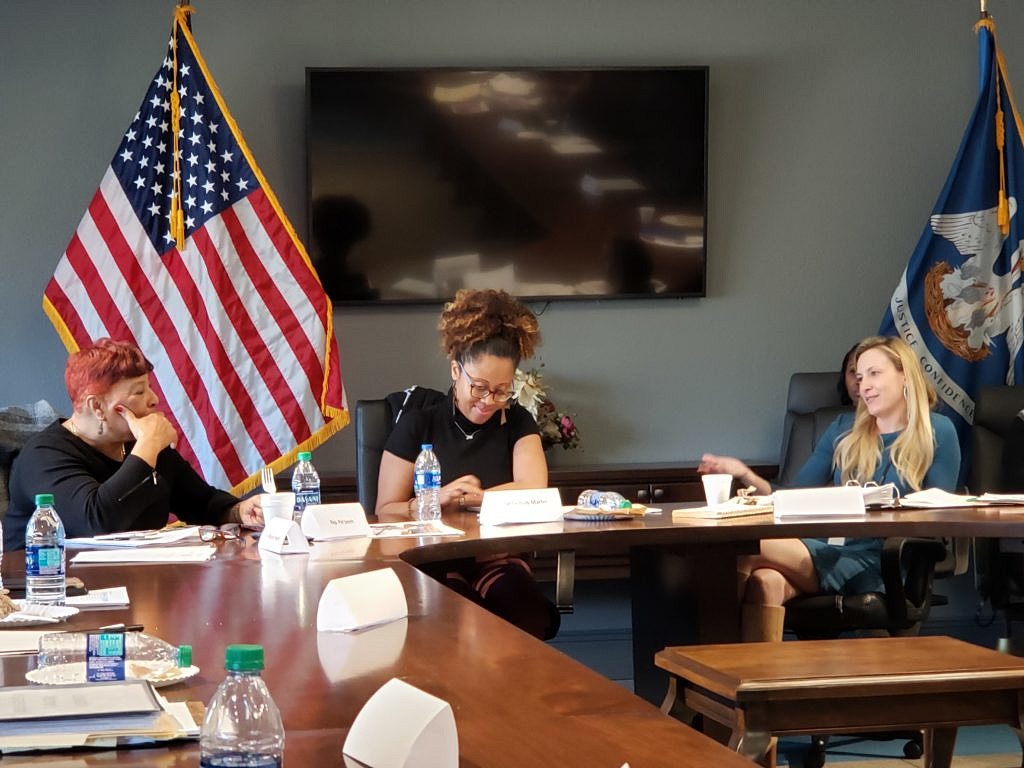
Above (L-R): Representative Patricia Smith, former member of the Louisiana House of Representatives; Syrita Steib, Executive Director of Operation Restoration; and Natalie LaBorde, Executive Counsel of the Louisiana Department of Public Safety and Corrections.
Even though there are far more men incarcerated nationwide than women, the number of women incarcerated across the United States grew at twice the rate of men between 1980 and 2016. In fact, the number of women incarcerated between 1980 and 2017 increased by 750%.
Currently, Louisiana’s women imprisonment rate (82 per 100,000 female residents) is higher than the imprisonment rate of the United States (63 per 100,000 female residents). As of June 2019, there were 1,633 women in custody and 12,237 women under supervision in Louisiana.
These statistics underscore the importance and significance of Louisiana being among the first states to formally study the needs and circumstances of justice-involved women and to submit recommendations to the legislature.
The Women’s Incarceration Task Force was created by House Concurrent Resolution 27 (HCR 27) in 2018 in recognition that incarcerated women face unique challenges in the criminal justice system. Through HCR 27, the state legislature asked the Task Force to study Louisiana’s criminal justice system as it relates to women and to recommend strategic changes to reduce recidivism and increase health and public safety. The Task Force consisted of a diverse group of female leaders with a variety of experiences: a state legislator, two judges, an assistant district attorney, Louisiana Department of Public Safety and Corrections (DOC) leadership and staff, formerly incarcerated women, community members, and leaders of community organizations working with women who are justice-involved.
For over a year, Task Force members discussed topics related to women’s incarceration and reentry, visited several jails and prisons, and heard from guest speakers, including currently and formerly incarcerated women. The Task Force also developed subgroups to delve deeper into housing, domestic violence, family reunification, programming available in correctional institutions, physical and mental healthcare, LGBTQ+ experiences, community supervision, and clemency. In April 2019, Task Force Chair and DOC Executive Counsel Natalie LaBorde invited CJI to help with the study and to facilitate the development of policy recommendations, with funding through the Bureau of Justice Assistance.
“It was a privilege to work with the Task Force members who are all dedicated to improving the lives of women in the criminal justice system,” said Barbara Pierce, Director of Justice Initiatives at CJI. “CJI was honored to assist with the study and help prioritize a set of recommendations that will transform women’s services in Louisiana’s prisons and on community supervision.”
The Task Force sent its report to the Louisiana legislature on June 19, 2020, enumerating its findings and laying out 21 recommendations. These recommendations aim to reduce recidivism and increase public safety outcomes among women by better addressing women’s unique risks and needs in the following ways:
• Improving the physical spaces where women are incarcerated;
• Expanding access to physical and behavioral health education and treatment while incarcerated;
• Increasing the gender-responsiveness of women’s incarceration experience;
• Increasing institutional programming options;
• Supporting gender-responsive reentry planning and release; and
• Making community supervision more gender-responsive.
Specific recommendations sent to the legislature include:
• Creating a central reception center for women in DOC custody;
• Assessing all women for trauma and providing treatment to address it;
• Ensuring DOC’s healthcare policies are gender-responsive;
• Training all DOC staff members and volunteers who interact with incarcerated women on gender-responsiveness;
• Increasing prerelease employment opportunities available to incarcerated women; and
• Requiring recipients of Community Incentive Grants to provide gender-specific programming.
In its research and review of Louisiana’s policies and practices, the Task Force found that women face gendered challenges while incarcerated and have unique needs compared to men. Given those, women require different responses – in content and delivery – in correctional settings and the community. For example, according to a BJS study using national data, 74% of women in state prisons meet criteria for substance dependence or abuse compared with 54% of men, illustrating women’s higher level of need for substance use treatment. While the state currently has some policies and practices in place that are specific to women’s needs, there are opportunities for Louisiana’s correctional system to enact gender-responsive practices by acknowledging gender differences, issues, and inequalities and incorporating that information into practice to better support women. Louisiana has an additional opportunity to utilize trauma-informed care in response to the nation’s high rates of trauma among women who are justice-involved.
The Task Force recommendations come at an opportune time. The DOC received approval from FEMA to rebuild the Louisiana Correctional Institute for Women (LCIW) in the fall of 2019 after the original LCIW, Louisiana’s only state-operated prison for women, flooded and became uninhabitable in 2016. Since then, the state continues to move women to various locations as needed. This decentralization means some women are housed in facilities where they cannot access programs (either because they do not exist or exist in a limited capacity) and makes the provision of all services, and particularly gender-specific services, challenging.

Natalie LaBorde, Executive Counsel of the Louisiana Department of Public Safety and Corrections and Task Force Chair
“The Task Force recommendations will have an incredible impact on women in the criminal justice system,” said Task Force Chair Natalie LaBorde. “DOC Secretary LeBlanc is committed to implementing the recommendations under DOC’s purview. As chair of the Task Force, I’m so grateful for the time and dedication of Task Force members, who were truly invested in this process from start to finish.”
Implementing the recommendations of the Task Force will require a sustained commitment from the state to improving the outcomes of women in Louisiana. With the Task Force recommendations and the rebuild of LCIW, Louisiana has a unique opportunity to reimagine what corrections for women looks like in this state, and to become a model for gender-responsive corrections and recidivism reduction strategies nationwide.